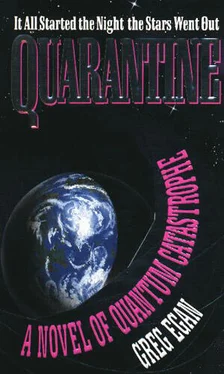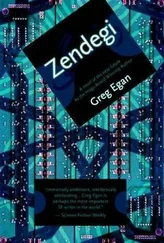Lui says quietly, 'There's no need for that. It's an optical supercomputer — taking random stabs at factoring a mega-digit number. To do the job systematically would take about ten-to-the-thirtieth years. The chance of the machine succeeding in a few hours, by pure good luck, is proportionately infinitesimal. However, in your hands —
For a moment, I'm actually scandalized: earnest, tormented Lui Kiu-chung is pimping my talent (borrowed from Po-kwai, stolen from Laura) for filthy commercial gain … but my shock soon gives way to grudging admiration. Let a computer smear — with the right kind of quantum randomness — and you create, in effect, a 'parallel' machine with an astronomical number of processors. Each one executes the same program, but applies it to different data. All you have to do is be sure that when you collapse the system, you choose the version that happened to find the needle in the mathematical haystack. And the world's first service to factor the huge numbers at the heart of (hitherto) de facto unbreakable codes is sure to rake in a fortune — at least, until word spreads too widely that such a service exists, and people stop trusting the codes.
I say, 'How do you know I won't just make the thing malfunction? If I can do it to locks, I can do it to computers. What if I choose some hardware failure so the light comes on for a wrong answer?'
He shrugs. 'That can't be made literally impossible — but I've taken steps to minimize the relative probabilities. In any case, it's easy enough to check the answer — and if it's wrong, we can just try again.'
I laugh. 'So, how much are you charging for this? Who's the client? Government or corporate?'
He shakes his head primly. 'I have no idea. There's a third party, a broker — and they're discreet about their own identity, let alone — '
'Yeah, sure. But… how much are you getting?'
'A million.'
'That's all?'
'There's considerable scepticism. Understandably. Later, once the method is proven, we can raise the price.'
I grin at him, and toss the box high in the air. 'And what's my cut? Ninety per cent sounds fair.'
He's not amused. 'The Canon has considerable expenses: the mod that lets you smear still hasn't been fully paid for.'
'Yeah? And once you have the eigenstate mod, you won't need my help at all, will you? So I'd better make good use of my bargaining position, while it lasts.' I was joking when I started the sentence, serious by the time I finished it. I say, 'Is this what the true Ensemble is, for you? Selling code-breaking services to whoever's willing to pay?'
He doesn't reply — but he doesn't deny it. He just gives me that old look of deep spiritual agony.
I ought to be angry — angry that he planned to screw me, angrier still at this blasphemy — but the truth is, after all the pathological brain-fucked fanaticism that the loyalty mod has engendered in most of the Canon — myself included — there's something almost… refreshing about his simple opportunism. I ought to be outraged — but I'm not. If anything, I feel a pang of envy: it seems he's manipulated his chains into a form that makes them almost irrelevant. Unless he was some kind of saint beforehand — someone who never would have dreamt of profiting from the Ensemble's work — his original personality may now be virtually restored.
The corollary of all of this envy and admiration is obvious — but false. Knowing what the loyalty mod is, I can't help being heartened to see that Lui is free of it — but that doesn't mean I want the same freedom for myself.
He says, 'I'll give you thirty per cent.'
'Sixty.'
'Fifty.'
'Done.' I don't give a shit about the money; it's a matter of pride. I want to make it clear to him that I, too, am almost human. 'Who else in the Canon knows about this?'
'Nobody. Yet. I'd like to present it to them as a fait accompli; I'm sure they'd all acknowledge that we need to raise funds, but I'd rather not give them the chance to argue about the details.'
'Veiy wise.'
He nods wearily. He has the same intensity, the same air of guilt and confusion about him as always, but the whole meaning of it has changed; half of it, no doubt, is pure affectation — and the rest, genuine exhaustion from maintaining so many layers of deception. I don't feel deceived, though, I don't feel cheated; the fact that I misread him so badly, for so long, only serves to make his unexpected sanity all the more welcome.
I smear for ten minutes before taking the device from my pocket — my standard precaution against the disconcerting effects of losing the delusion of free will. The LED is still unlit. I stare at it for a while, but nothing happens. I'm puzzled by one thing: the probability of a malfunction causing the light to come on by now can't be literally zero — so why hasn't my smeared self seized upon a state in which that happens? Perhaps he's cautious enough to wait for the states containing a working computer and a right answer to begin to emerge — and, hopefully, drown out the false signal.
I grow bored, then nervous, then bored again; I wish I could use P3.I ought to be able to mimic its effects — by choosing a state in which I 'happen to' feel exactly as if I were primed — but my smeared self never seems to bother. I can't stop half-expecting to be interrupted by a shout from Po-kwai — but, thinking back on the times when I've woken her, there's always been a trigger: a strong emotion, a shock. Staring at a black box, waiting for a light to come on, just doesn't rate. And tomorrow? If I can manage to stay calm, perhaps I'll be safe … whatever 'manage to stay calm' means, when the mere fact that I might wake Po-kwai, increasing her influence on everything that happens, must be taken into account to determine whether or not I actually do. Trying to trace out a linear chain of cause and effect is futile; the most I can hope for is successful rationalization along the way, and a kind of static consistency in the pattern of events, looking back on them afterwards.
It's four seventeen when the LED finally glows, a steady, piercing blue. I hesitate before collapsing. The longest odds ever — so, how many versions of me die, this time? But those qualms have been all but 'bred out' of me. I still don't know what to believe, but each time Ô come through the supposed holocaust unscathed, it grows ever harder to care. I tick the OFF switch —
— and … someone survives. My memories are consistent, my past is unique; what more can I ask for? And if, a second ago, ten-to-the-thirty-something living, breathing human beings really were sitting here, wondering when the LED would finally come on for them… well, the end was quick and painless.
In any case, Po-kwai is right; this is what it means to be human: slaughtering the people we might have been. Metaphor or reality, abstract quantum formalism or flesh-and-blood truth, there's nothing I can do to change it.
I cut through Zeno's Lethargy and choose sleep, with surprising ease. In the early afternoon, I deliver the computer to — of all places — the junk-nanotech stall where I picked up Hyper nova. (More of Lui's bizarre notions of security; I swear to myself that, after tonight, I'm going to start sorting out that mess.) The LED is still glowing when I hand the thing over — an encouraging sign. Apparently, the program loops endlessly once it finds the factors, repeatedly confirming the result… so either I've caused some permanent corruption which is making the machine consistently lie, or the whole audacious scheme has worked — and an independent check on a second computer will soon settle the issue. Just what our sceptical clients will make of this impossible feat, I don't know; in their place, I'd suspect I was being set up for a torrent of disinformation. Maybe they'll decode great slabs of genuine data, and assume that it's all designed to mislead them. I glance up at a patch of cloudless blue sky, and laugh.
Читать дальше










